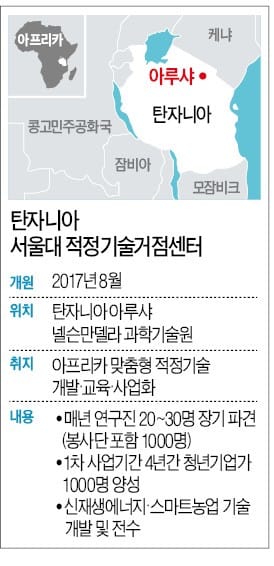Department News
Seoul National University established in Tanzania ... Promotion of renewable energy and agricultural technology
First local University to debouch in Africa<?xml:namespace prefix = "o" ns = "urn:schemas-microsoft-com:office:office" />
Launched the ‘Appropriate Technology Center' in August
Support for power and food shortage
1000 young entrepreneurs nurtured
Seoul National University is the first university in Korea to establish a base research institute in Africa. It is a project to develop and distribute renewable energy and smart agricultural technology suitable for Tanzania suffering from chronic food shortage and power shortage. 1,000 young entrepreneurs are planned to be trained in the local area for four years to help them hone their skills and interact with Korea.
According to Seoul National University, the university will open a "Technology Technology Center" in Arusha City, Tanzania in August to study appropriate technology and raise local entrepreneurs. Proper technology will bring local customized technology for improving the quality of life like a hand-held water pump. This is the first time for a Korean university to establish a research institute in Africa with the means of both academic and educational functions.
Seoul National University is paying attention to Tanzania's potential for growth with rich resources such as gold coffees and political stability.
Despite the fact that per capita income is only 840 US dollars (as of 2016), the economy is growing at a rate of 6 ~ 7% per annum at 54 million, making it the "Blue Ocean" market in East Africa.
Tanzania is actively promoting overseas universities because of lack of research and education infrastructure necessary for growth. Nelson Mandela, the Center for African Advanced Institute of Science and Technology (NM-AIST), is regarded as the KAIST in Tanzania. Nevertheless, there are four professors and 45 professors. NM-AIST provides about 1000 square meters of land and buildings free of charge to Seoul National University.
Seoul National University decided to dispatch 20 ~ 30 researchers every year at the College of Engineering, Life Science and Science, etc, to operate the center. The SNU research team plans to install a new and renewable energy power plant using four solar wind turbines at four Oji villages to supply electricity to about 1,200 residents. Professor Kim Joon-hyun's team will develop and distribute smart farming technology that will boost agricultural productivity in Africa in response to climate change.
The center also has support facilities to help young entrepreneurs in Tanzania start up their technology. Chairman of the invitation center will be Chae-Won E3 Im Power, who developed a low-power solar energy panel in Silicon Valley, USA. After receiving his Ph.D. in Mechanical Engineering from Stanford University, Lee has established E3 ImPower, a social enterprise that supports small start-ups in underdeveloped countries in Africa.
The Center provides technical and entrepreneurial training programs to train 1,000 young entrepreneurs during the first four years of the project. Sung-Hoon Ahn / Professor, Department of Mechanical and Aerospace Engineering, SNU who led the establishment of the center, said, "The cooperation system that combines the technology of university researchers with the local know-how and the goal is to establish two local start-ups (start-up venture companies) representing Arusha city with a population of 320,000 in four years and to sign more than five technology contracts."
Shin Hee-young, vice-president of research at Seoul National University, said, "It will be a test site for new models that will develop appropriate technology for commercialization and deviate from official development aid (ODA)." In the long term, we will spread the project to neighboring countries such as Kenya Malawi Mozambique."

Hwang Jung Hwan reporter jung@hankyung.com
Go to article http://www.hankyung.com/news/app/newsview.php?aid=2017051123191

